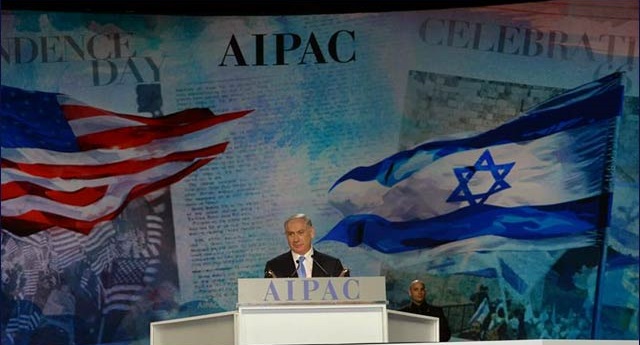Obama’s War Against Pro-Israel Lobby Group AIPAC
In today’s edition of the New York Times is an article revealing the widening rift between President Obama and pro-Israel lobby group, AIPAC. He is angered at an affiliate running multi-million ads against his signature foreign policy legacy, the Iran nuclear pact or JCPOA, “Fears of Lasting Rift as Obama Battles Pro-Israel Group on Iran.”
He is apparently taking this very personally as reflected in his American University speech with references to his bête noire, Israeli PM Netanyahu, and unnamed “lobbyists” running multi-million ads painting him as the contemporary send up to British Prime Minister Neville Chamberlain, appeasing Hitler at Munich in 1938. The Times has more on the President’s contentious meeting with 20 American Jewish leaders at the White House and the extensive efforts to brief ad answer questions to New York U.S. Senator, Charles Schumer, who ultimately came out rejecting it, unlike his upstate colleague, Sen. Kirsten Gillibrand gave her commitment, although with some ostensible misgivings. Here are some examples:
President Obama had a tough message for the American Israel Public Affairs Committee, or Aipac, the powerful pro-Israel group that is furiously campaigning against the Iran nuclear accord, when he met with two of its leaders at the White House this week. The president accused Aipac of spending millions of dollars in advertising against the deal and spreading false claims about it, people in the meeting recalled.
So Mr. Obama told the Aipac leaders that he intended to hit back hard.
The next day in a speech at American University, Mr. Obama denounced the deal’s opponents as “lobbyists” doling out millions of dollars to trumpet the same hawkish rhetoric that had led the United States into war with Iraq. The president never mentioned Aipac by name, but his target was unmistakable.
[…]
“It’s somewhat dangerous, because there’s a kind of a dog whistle here that some people are going to hear as ‘it’s time to go after people,’ and not just rhetorically,” said David Makovsky, a former Middle East adviser for the Obama administration and now an analyst at the Washington Institute for Near East Studies. But Aipac’s claims, he said, had been just as overheated. “There’s almost a bunker mentality on both sides.”
[…]
“This has nothing to do with anybody’s identity; this is a policy difference about the Iranian nuclear program,” said Benjamin J. Rhodes, the deputy national security adviser for strategic communications. “We don’t see this as us versus them,” Mr. Rhodes added, predicting that the White House and Aipac would work closely in the future on other matters, including Israeli security. “This is a family argument, not a permanent rupture.”
Mr. Schumer’s Courting and AIPAC’s media war:
[AIPAC] had sent 60 activists to Mr. Schumer’s office to lobby him last week, while Citizens for a Nuclear Free Iran, an offshoot Aipac formed to run at least $25 million in advertising against the deal, ran television spots in New York City. As Mr. Schumer deliberated, he spoke with Aipac leaders, but also with representatives of the pro-Israel group J Street, which supports the deal.
The White House courted Mr. Schumer heavily even though officials always suspected he would oppose the agreement, they said Friday. “I don’t know if the administration’s been outlobbied,” Josh Earnest, the White House press secretary, said Thursday before Mr. Schumer’s announcement. “We certainly have been outspent.”
Besides individual meetings with Mr. Obama, Secretary of State John Kerry and Wendy R. Sherman, the chief negotiator, Mr. Schumer had three hourlong meetings with members of the negotiating team, who answered 14 pages of questions from him.
Mr. Schumer hashed out further details with Mr. Kerry, Ms. Sherman and Energy Secretary Ernest J. Moniz in a recent dinner at the State Department. Mr. Obama, in the White House meeting with Aipac leaders, sharply challenged the group after one of its representatives, Lee Rosenberg, a former fund-raising bundler for Mr. Obama’s 2008 campaign, said the administration was characterizing opponents of the deal as warmongers, according to several people present, who would speak about the private meeting only on the condition of anonymity. The meeting included some 20 leaders of other Jewish organizations.
Then there was the Obama full court Press with AIPAC after his trip to Africa:
The friction between Mr. Obama and Aipac over the Iran deal has been building for months. Last week, as Mr. Obama made his way back from Africa on Air Force One, White House officials learned that Aipac would be flying 700 members from across the country to Washington to pressure their members of Congress to reject the deal. Mr. Obama’s team asked to brief the group at the White House, and was told instead to send a representative to the downtown Washington hotel where the activists were gathering before their Capitol Hill visits, according to people familiar with the private discussions.
Ms. Sherman; Adam J. Szubin, the Treasury official who handles financial sanctions; and Denis R. McDonough, the White House chief of staff, all made presentations to the group, but were barred from taking questions to further explain it. White House officials said they were told from the start there would be no questions, while Aipac supporters said that they would have allowed questions but that there was no time.
Whatever the case, Mr. Obama took offense and later complained at the White House to Aipac leaders that they had refused to allow Ms. Sherman and other members of his team to confront the “inaccuracies” being spread about the agreement, leaving him to defend the deal to wavering lawmakers who had been fed misinformation about it.
President Obama has arrogated to himself the dismissal of any and all critics of his foreign policy legacy. He has gone out of his way to criticize pro-Israel AIPAC’s affiliate, Citizens for a Nuclear Free Iran, running video ads portraying him as an appeaser in the mold of Neville Chamberlain at Munich promoting the Iran nuclear pact as cutting off the Islamic regime from obtaining a nuclear weapon for ten years.
Experts like David Albright from the Washington, DC -based Institute for Science and Technology told Congress that it is more likely less than a few months not the suggested one year at a ten year sunset in the JCPOA. Moreover there is increasing evidence that the agreement has serious flaws and is being flaunted by the Islamic Republic even before Congress votes to accept or reject in mid-September. Witness the comments of Wendy Sherman at a Senate Banking Committee hearing this week that she had only looked at drafts of the IAEA side deals. Then on the same day there was a closed door briefing by IAEA director general Akiya Amano to a bi-partisan group of Senators and Representatives during which he said they couldn’t release the confidential memos with Iran dealing investigation of prior military developments. Many Congressional members came away with a distinct impression that the so-called robust intrusive inspection regime was doubtful. At the same Banking Committee hearings, FDD’s executive director Marc Dubowitz testified that the snap back sanctions if Iran was caught cheating on a sneak out to a nuclear weapon were illusory at best.
Iran sent controversial Quds Force Commander Soleimani to Moscow to meet Russian President Putin and close ally Defense Minister Gen Shogui to speed up deliveries of the S-300 advanced air defense system violating both his travel bans and UNSC Resolution 1929 banning purchases of conventional weapons and missile technology. That was less than 10 days after the pact was announced.
Thus for President Obama to single out AIPAC as warmongering “lobbyists” in his American U speech was churlish and gratuitous set against the threats and violations by the Islamic regime. No wonder after extensive briefings and questions of the Obama negotiating team, NY Sen. Schumer, future Senate Democrat leader, came out and said he was opposed to the Iran deal.
 This Times comment from Malcolm Hoenlein of the umbrella COPMAJO sums up the widening rift with Obama over his characterization of AIPAC and other groups opposing the Iran nuclear pact: “Words have consequences, especially when it’s authority figures saying them, and it’s not their intent, perhaps, but we know from history that they become manipulated,” said Malcolm Hoenlein, executive vice chairman of the Conference of Presidents of Major American Jewish Organizations, repeating a concern he had raised directly with Mr. Obama during the closed-door session. “Of all political leaders,” Mr. Hoenlein added, “he certainly should be the most sensitive to this.”
This Times comment from Malcolm Hoenlein of the umbrella COPMAJO sums up the widening rift with Obama over his characterization of AIPAC and other groups opposing the Iran nuclear pact: “Words have consequences, especially when it’s authority figures saying them, and it’s not their intent, perhaps, but we know from history that they become manipulated,” said Malcolm Hoenlein, executive vice chairman of the Conference of Presidents of Major American Jewish Organizations, repeating a concern he had raised directly with Mr. Obama during the closed-door session. “Of all political leaders,” Mr. Hoenlein added, “he certainly should be the most sensitive to this.”
That reminds us of the exchange between Alice and Humpty Dump from Lewis Carroll’s “Through the Looking Glass:”When I use a word,’ Humpty Dumpty said in rather a scornful tone, ‘it means just what I choose it to mean — neither more nor less.””The question is,” said Alice, “whether you can make words mean so many different things.”The question is,” said Humpty Dumpty, “which is to be master— that’s all.”
EDITORS NOTE: This column originally appeared in the New English Review.

